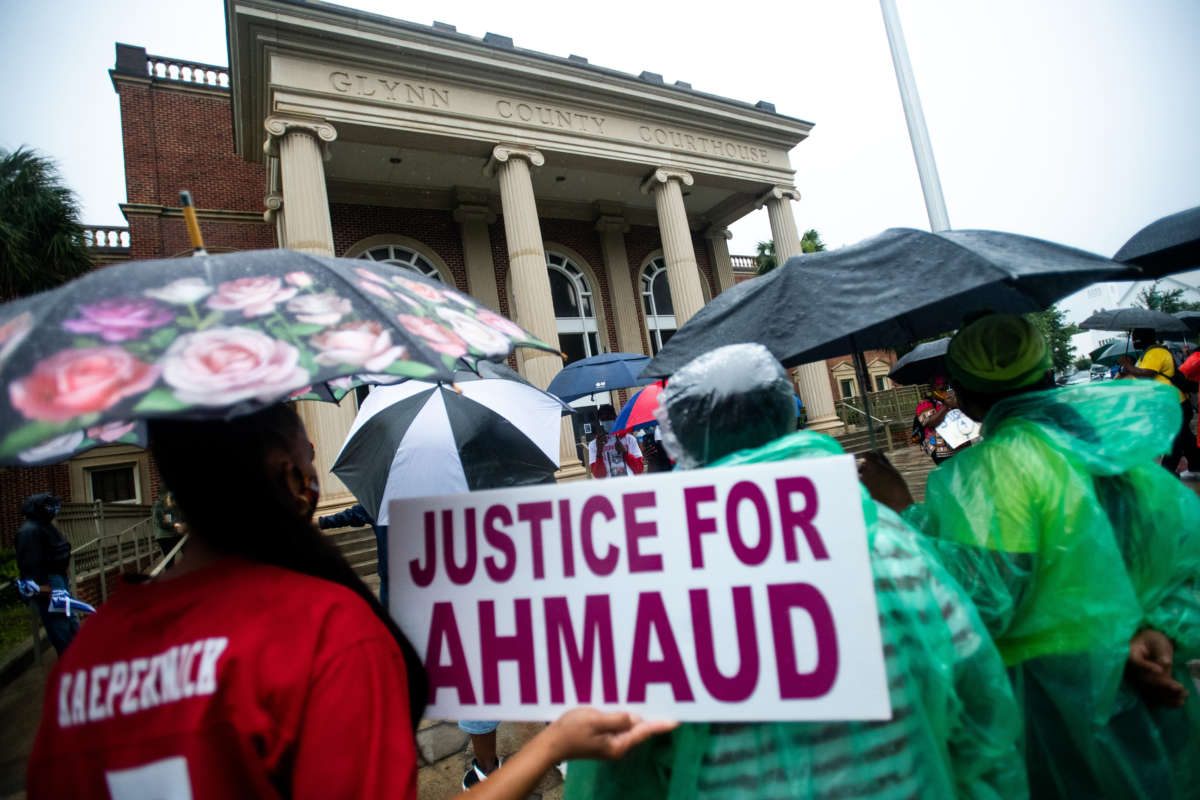Support justice-driven, accurate and transparent news — make a quick donation to Truthout today!
Lawmakers in Georgia overwhelmingly passed new legislation that will repeal the state’s provision on citizen’s arrests, a move that came in response to public outcry over the 2020 killing of Ahmaud Arbery, a 25-year-old Black man who was shot and murdered while jogging by two white men in Georgia.
The bill passed the House by a unanimous 169-0 vote on Wednesday. Earlier this week, the Senate also approved the measure, voting 51-1 to advance it.
Gov. Brian Kemp has signaled his strong support of the bill. “I look forward to signing it into law as we continue to send a clear message that the Peach State will not tolerate sinister acts of vigilantism in our communities,” he said.
While repealing major aspects of the citizen’s arrest provision in state code, the bill leaves intact a number of ways that individuals can still detain another person under suspicion of having committed a crime, private businesses or on an individual’s personal property. Security officers, private investigators, and truck scale inspectors are also permitted to detain individuals under the new proposal.
Still, the bill states that “private actors who do not do what the law requires can be held responsible for false imprisonment” and be “civilly liable” for their actions, A Just Georgia, a nonprofit organization that bills itself as “a coalition of organizations, organizers, and lawyers, working to transform the conditions of criminalization and racialized violence,” tweeted on Wednesday.
The advancement of the bill came about in response to the 2020 killing of Ahmaud Arbery, a 25-year-old Black man who was shot and murdered near Brunswick, Georgia, while jogging. Gregory McMichael, a retired law enforcement officer, along with his son, Travis McMichael, chased Arbery down in their truck as he was out on his run.
After Travis McMichael exited the vehicle, he confronted Arbery, then shot and killed him. Both white men tried to justify chasing and shooting Arbery by saying he resembled someone who was suspected of home invasions in the area at the time. Gregory McMichael also claimed that Arbery had “violently” attacked his son, but the release of video of the killing demonstrated that did not happen.
In the months between February, when Arbery was killed, and May, when the video was published online, prosecutors in Georgia had refused to take any legal action against the McMichaels, justifying their refusal to do so on the state’s citizen’s arrest law. Following the release of the video, public outcry led to both men being charged in Arbery’s murder.
Many citizen’s arrest laws have racist histories. Georgia’s version of the law, originally passed in 1863, was intended to allow white slavers to capture Black individuals attempting to escape enslavement to join the Union Army during the Civil War. In the early 1900s, the law was also used to facilitate the lynchings and killings of Black people at the hands of white residents.
A number of organizations have celebrated the bill’s advancement. When an earlier version had passed last month, the Southern Center for Human Rights (SCHR) lauded the moves to end the outdated and racist law.
The citizen’s arrest statute was “an unnecessary law that has been used for more than 150 years to justify anti-Black violence,” Marissa Dodson, SCHR’s public policy director, said at the time.
The SCHR also tweeted in support of the more recent passage of the bill this week, but noted that the Republican-led state legislature had also recently passed a number of other oppressive bills.
Those bills, which include the expansion of mandatory cash bail and limits on local governments to reduce their police budgets, “will further harm communities most impacted by the failures of our criminal legal systems,” the organization said.
A terrifying moment. We appeal for your support.
In the last weeks, we have witnessed an authoritarian assault on communities in Minnesota and across the nation.
The need for truthful, grassroots reporting is urgent at this cataclysmic historical moment. Yet, Trump-aligned billionaires and other allies have taken over many legacy media outlets — the culmination of a decades-long campaign to place control of the narrative into the hands of the political right.
We refuse to let Trump’s blatant propaganda machine go unchecked. Untethered to corporate ownership or advertisers, Truthout remains fearless in our reporting and our determination to use journalism as a tool for justice.
But we need your help just to fund our basic expenses. Over 80 percent of Truthout’s funding comes from small individual donations from our community of readers, and over a third of our total budget is supported by recurring monthly donors.
Truthout has launched a fundraiser, and we have a goal to add 273 new monthly donors in the next 72 hours. Whether you can make a small monthly donation or a larger one-time gift, Truthout only works with your support.
